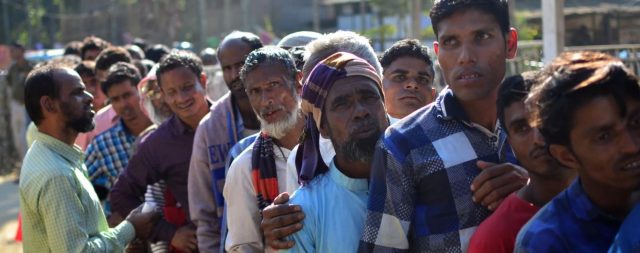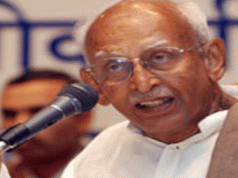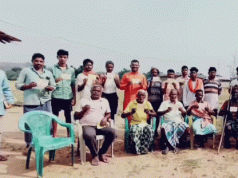
Jharkhand Chief Minister Raghubar Das could be media shy and so far maintained a low-profile personality. But when he trusts his visitors including journalists, Das exudes a different vibe.
“Unlike past, I am not a majboor (helpless) Chief Minister. I am majboot (strong-willed),” says he about some of his predecessors—who, he said, often succumbed to arm-twisting either from Christian groups and other socio-economic ‘pressure groups’.
On this backdrop, he is unapologetic about taking central funds and assets under Narendra Modi as Prime Minister—no such assistance is given away as ‘a favour’ to the states.
“I do not go to Delhi to ask for money, Delhi comes here and allows the funds…We place our demand and requirements. It is either Finance Commission or the NITI Aayog; the money comes to us. It is Prime Minister Modi’s Team India vision,” he says.
Das is also not apologetic about his Government or his party’s stance on Christians in the State or on the issue of Bangladeshi infiltration and the demand for ‘Assam type’ National Register of Citizens here.
To Push out the Illegal
“Ek ek Bangladeshi ko khoj khoj key desh ke bahar nikalenge (BJP is clear about it, we will trace each Bangladeshi and throw them out of the country),” says Das.
Chief Minister says, “Bangladeshis have infiltrated into Jharkhand through Malda-Mushidabad belt in West Bengal…They have spread all across the State. Most of them are seen in Lungis…The labour works that our tribal people used to do have been snatched by Bangladeshis. They are into cyber crimes too”.
Little to guess, the Chief Minister blames the Congress party and insists things would not have taken such ominous dimension had not the grand old party indulged in politics of vote bank and division for 60 years.
“We have taken a stand…There is already a precedent now that Supreme Court had ordered NRC in Assam…From our Jharkhand government too, we have submitted papers with the Union Home Ministry giving details. So, we want NRC in Jharkhand also,” he says.
“A large number of Bangladeshis now live in Pakur, Sahebganj and Godda districts. There are Bangladeshis in Ranchi and in my town Jamshedpur too,” says Das. “Though numbers are few, Bangladeshis are in Lohardaga district also,” he says.
Endorsement for the Action
Senior officials in the State readily endorse what the Chief Minister has to say. Chief Minister’s Principal Secretary, Sunil Kumar Barnwal, says, “It is estimated in Pakur district, almost 50 per cent of the population are Bangladeshis… They are residing here illegally. There are many Bangladeshis in Sahebganj and Godda too.”
BJP leaders in poll management in Jharkhand say tackling ‘Bangladeshi influx’ menace has also become “challenging task electorally also”. “On the administrative front, the Jharkhand state government has alerted the Union Home Ministry and recommended NRC. Politically, BJP needs to draw an electoral plan as we ought to deal with Bangladeshi influx issue in at least 18 assembly segments. It will be a challenge,” says a BJP leader.
In this context, the Chief Minister says: “Not only in Jharkhand, but most problems in the country are also due to vote bank politics of Congress. They pushed the politics of caste and divisions. Under Prime Minister Narendra Modiji, we are doing the politics of development and have been successful in ending the politics of divide in last four years.”
“Look, we had gas connections and now the health cards, is there any pick and choose method? Are we asking who is Muslim who is Hindu,” says Raghubar Das. “Garib ka koi jaat nahi hota (Poverty has no caste or creed),” he says and points out Prime Minister’s vision of ‘Sabka Saath, Sabka Vikaas’ is therefore more relevant.
Against Naxalism
Besides the NRC issue vis-a-vis Muslims, the BJP government in the state feels its actions against Naxalism will also be appreciated by the people.
The Chief Minister Raghubar Das states, “If you ask me my Government’s single “biggest achievement” in the three-and-a half years, it is our successful crusade against Naxalism. The Maoist forces are now pushed to the wall. I say the Naxalism in Jharkhand is nearing its end. It is the biggest achievement of my government, alongside the development”.
There is yet another crucial area – Raghubar Das government is working overtime to make an impact. “There is a motivated campaign and vested interests involved who always want to keep Jharkhand backward and poor. I say this is linked to creating a ground for conversion of locals into Christianity”, the State Chief Minister told Organiser.
“It is my experience of last three years….There is a vested interest who always wanted to keep Jharkhand backwards. If the state remained poor, then conversion (to Christianity) is easy,” he says. The BJP Government, he says, has proven ‘sensitive’ to the problems of the local citizens especially tribals and thus a law has been passed to ban conversion by luring over the poor people with money or materials. “These forces are desperate…..their shops are closed,” he maintains.
Asked whether according to him most ‘anti-government’ protests are sponsored, Mr Das agrees in an affirmative note saying: “Yes…100 per cent ….200 per cent all these agitations and protests in my state are sponsored and part of proper planning”. But he said the overall relations between his Government and the Christians in the state are “very good”.
“What I am speaking about the ill motive….it is not for all Christians. Some Christian organisations are bringing disrepute to the Christians,” he said adding an overwhelming number of Christians have backed and supported his government’s endeavour to intensify Swacchta Abhiyan (Cleanliness Drive) in the state.
It is not the first time; the Chief Minister is in confrontationist stance against the Christians. In 2016, he blamed the Christian community for inflaming ‘protest’ over his government’s decision to pass land acquisition law.
A spokesman of Rashtriya Isai Mahasangh, a Christian body, dismisses the allegations from the Chief Minister. “His Government has done nothing for the poor and tribal people in the state,” says the Christian leader.
However, the Chief Minister is sanguine about his remarks. “My government is strong…It is not weak. Earlier, these organisations used to keep the governments in fear. Look, common people in my state are concerned about their needs. Even Christians are getting gas and benefits of other welfare schemes,” he says.
Source: Swati_Deb’s Article in Organiser














